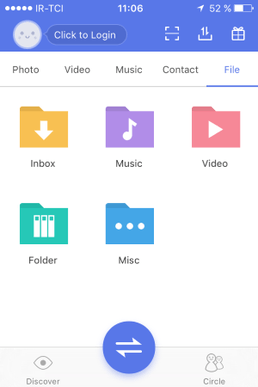Zapya
Zapya (Kuai Ya/快牙in Chinese) is a Chinese peer-to-peer file sharing app. While the app was initially conceived for the Chinese market, it has spread to neighbouring countries including Myanmar,[5] Pakistan and India and is available across multiple operating systems.
Screenshot  Screenshot of Zapya on [[iPho
ne 4S]], with "File" tab selected | |
| Developer(s) | Dew Mobile Inc. (Wang Xiao Dong Steve Gu Shangpin Chang) |
|---|---|
| Operating system | Android, iOS, Windows 10 Mobile, Windows NT, macOS |
| Available in | |
| Type | Utility software |
| Licence | Freeware |
| Website | izapya |
The app enables users in countries with low internet penetration and poor internet architecture to transfer and share files without using the Internet, by creating a Wi-Fi hotspot to which other devices can connect.[6] The app allows communities to make a local network and then transfer data, such as apps, videos & music, back and forth.[7][6] In addition, Zapya's "Phone Replicate" feature can easily backup and transfer files from an old mobile device to a new one.[8]
In November 2019, the leaked China Cables revealed that the Chinese government's mass surveillance and predictive-policing programme Integrated Joint Operation Platform (IJOP) flagged 1.8 million users with Zapya on their phones for investigation as part of the crackdown on Uyghur Muslims.[9]
Zapya does not support Uyghur, Arabic, and Kazakh languages.
See also
- Utility software
References
- https://play.google.com/store/apps/details?id=com.dewmobile.kuaiya.play
- "Zapya - File Sharing & WiFi Transfer Tool on the App Store". App Store. Retrieved 14 September 2017.
- "Buy ZAPYA - Microsoft Store". Microsoft Store. Retrieved 14 September 2017.
- "Zapya - File Transfer Tool on the Mac App Store". Mac App Store. Retrieved 14 September 2017.
- Mod, Craig. "The Facebook-Loving Farmers of Myanmar". theatlantic.com. Retrieved 14 September 2017.
- "Offline and falling behind: Barriers to Internet adoption". McKinsey & Company. Retrieved 14 September 2017.
- "Dailyfaqs.com". www.dailyfaqs.com. Retrieved 14 September 2017.
- "Data leak reveals how China 'brainwashes' Uighurs in prison camps", BBC News, 24 November 2019.